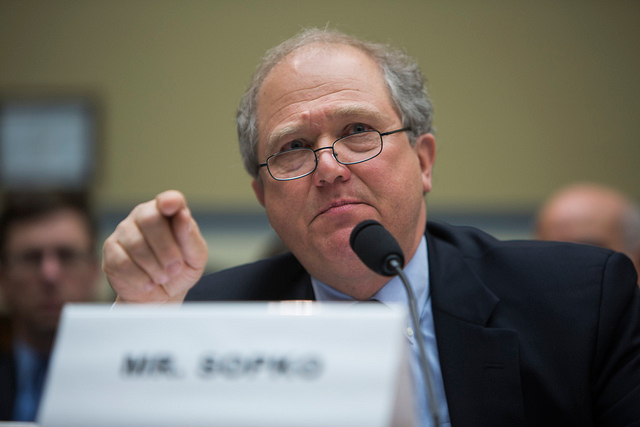
As the most prominent official overseeing the War in Afghanistan, John Sopko has made some enemies among hawks on Capitol Hill.
At a House Oversight Committee panel on Wednesday, Sopko had a warning for them.
“The first day I’m out of this job — because it’s not my job to talk policy — I’m happy to publicly tell you what I really think about our mission in Afghanistan,” he said.
The Special Inspector General of Afghanistan Reconstruction (SIGAR) was responding to a question from Rep. Walter Jones (R-NC).
A lawmaker since 1995, Jones has been a critic of US military intervention since the middle of last decade, after the War in Iraq. He isn’t even on the Oversight Committee, but was allowed to participate in Wednesday’s proceedings by Ron DeSantis (R-Fla), chair of the Subcommittee on National Security.
“I know there are people who don’t appreciate you and your staff and what you do because many of them are in Congress,” Jones said, referring to media reports last year.
In May 2016, Politico ran a lengthy article calling Sopko’s work into disrepute, entitled “The Donald Trump of inspectors general.” The piece featured claims that Sopko’s analyses are flimsy, and that he’s mostly interested in media attention.
The article centered on unattributed quotes from national security mandarins, and previously public criticism of Sopko, from John McCain (R-Ariz) and Jack Reed (D-RI), leaders of the Senate Armed Services Committee. Sopko has served as SIGAR since 2012.
“Y’all are the truth tellers,” Jones added on Wednesday. “The problem is Congress continues to pass, to waste money over there, and we can’t even get a debate.”
In July, House Republican leaders unilaterally stopped legislation that would have put an eight month sunset on the broad, vague post-9/11 law authorizing the War on Afghanistan and the Global War on Terror. It had been passed through committee overwhelmingly, without a recorded vote, and was proposed by Rep. Barbara Lee (D-Calif.) — the only lawmaker in both houses of Congress to vote against the so-called 2001 AUMF.
While there wasn’t much criticism of Sopko at Wednesday’s hearing, the subcommittee wasn’t without harsh words for the watchdog.
“The more that we feed this narrative that our nation does not have the will and the resolve to get things done is part of the problem,” Rep. Steve Russell (R-Okla.) said.
A veteran of Afghanistan, Russell, at one point, seemed to question the very idea of civilian oversight of ongoing military operations.
“What is hard for me as a warrior — for most of my adult life — it’s always people sitting here talking to people sitting there, pointing bony fingers with red faces saying: ‘why is this a failure?’ Why did this go wrong? We should quit. We should pull out,” he said.
Our most important fundraising appeal of the year
December is the most critical time of year for Truthout, because our nonprofit news is funded almost entirely by individual donations from readers like you. So before you navigate away, we ask that you take just a second to support Truthout with a tax-deductible donation.
This year is a little different. We are up against a far-reaching, wide-scale attack on press freedom coming from the Trump administration. 2025 was a year of frightening censorship, news industry corporate consolidation, and worsening financial conditions for progressive nonprofits across the board.
We can only resist Trump’s agenda by cultivating a strong base of support. The right-wing mediasphere is funded comfortably by billionaire owners and venture capitalist philanthropists. At Truthout, we have you.
We’ve set an ambitious target for our year-end campaign — a goal of $240,000 to keep up our fight against authoritarianism in 2026. Please take a meaningful action in this fight: make a one-time or monthly donation to Truthout before December 31. If you have the means, please dig deep.